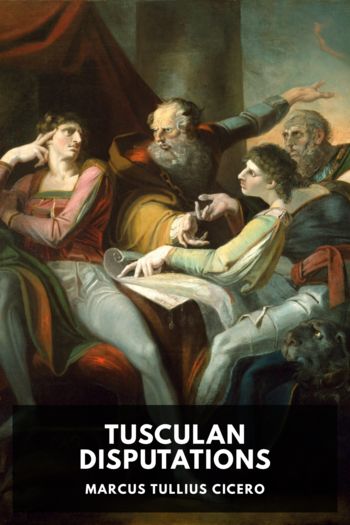Tusculan Disputations, Cicero [good book recommendations TXT] 📗

- Author: Cicero
Book online «Tusculan Disputations, Cicero [good book recommendations TXT] 📗». Author Cicero
The man who attempts to set bounds to vice acts like one who should throw himself headlong from Leucate, persuaded that he could stop himself whenever he pleased. Now as that is impossible, so a perturbed and disordered mind cannot restrain itself and stop where it pleases. Certainly whatever is bad in its increase is bad in its birth. Now grief and all other perturbations are doubtless baneful in their progress, and have, therefore, no small share of evil at the beginning. For they go on of themselves when once they depart from reason, for every weakness is self-indulgent, and indiscreetly launches out and does not know where to stop. So that it makes no difference whether you approve of moderate perturbations of mind, or of moderate injustice, moderate cowardice, and moderate intemperance; for whoever prescribes bounds to vice admits a part of it, which, as it is odious of itself, becomes the more so as it stands on slippery ground, and being once set forward, glides on headlong and cannot by any means be stopped.
Why should I say more? Why should I add that the Peripatetics say that these perturbations, which we insist upon it should be extirpated, are not only natural, but were given to men by nature for a good purpose? They usually talk in this manner. In the first place, they say much in praise of anger. They call it the whetstone of courage, and they say that angry men exert themselves most against an enemy or against a bad citizen: that those reasons are of little weight which are the motives of men who think thus, as—it is a just war; it becomes us to fight for our laws, our liberties, our country—they will allow no force to these arguments unless our courage is warmed by anger. Nor do they confine their argument to warriors, but their opinion is that no one can issue any rigid commands without some bitterness and anger. In short, they have no notion of an orator either accusing or even defending a client without he is spurred on by anger. And though this anger should not be real, still they think his words and gestures ought to wear the appearance of it, so that the action of the orator may excite the anger of his hearer. And they deny that any man has ever been seen who does not know what it is to be angry, and they name what we call lenity by the bad appellation of indolence. Nor do they commend only this lust (for anger is, as I defined it above, the lust of revenge), but they maintain that kind of lust or desire to be given us by nature for very good purposes, saying that no one can execute anything well but what he is in earnest about. Themistocles used to walk in the public places in the night because he could not sleep, and when asked the reason, his answer was that Miltiades’s trophies kept him awake. Who has not heard how Demosthenes used to watch, who said that it gave him pain if any mechanic was up in a morning at his work before him? Lastly, they urge that some of the greatest philosophers would never have made that progress in their studies without some ardent desire spurring them on. We are informed that Pythagoras, Democritus, and Plato visited the remotest parts of the world, for they thought that they ought to go wherever anything was to be learned. Now, it is not conceivable that these things could be effected by anything but by the greatest ardor of mind.
They say that even grief, which we have already said ought to be avoided as a monstrous and fierce beast, was appointed by nature, not without some good purpose, in order that men should lament when they had committed a fault, well knowing they had exposed themselves to correction, rebuke, and ignominy. For they think that those who can bear ignominy and infamy without pain have acquired a complete





Comments (0)